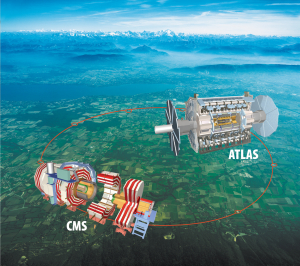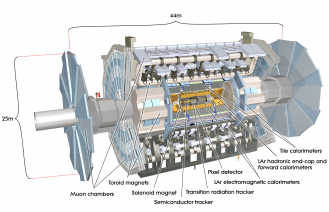Media
Scientists and students from Hong Kong join a top particle physics experiment
07 Jul 2014
Part of the Hong Kong team in front of the ATLAS detector. From right to left: Professor Chu Ming-chung, Research Assistant Chan Yat-long, MPhil student Tsui Ka-ming, undergraduate students Chow Yun-sang, Tam Pok-ho, Dung On-yu, and PhD student Haonan Lu.
A team of physicists from Hong Kong has now formally joined one of the most prestigious physics experiments in the world. Following a unanimous vote of approval today by its Collaboration Board, ATLAS has admitted the Hong Kong team as a member. The ATLAS Collaboration operates one of the largest particle detectors in the world, located at the Large Hadron Collider (LHC), the world’s highest energy particle accelerator at CERN, Switzerland. In 2012, the ATLAS team – along with the CMS Collaboration – co-discovered the Higgs boson, or so-called ‘God Particle’. The gigantic but sensitive and precise ATLAS detector, together with the unprecedentedly high collision energy and luminosity of the LHC, make it possible to search for fundamentally new physics, such as dark matter, hidden extra dimensions, and supersymmetry – a proposed symmetry among elementary particles. The LHC is currently undergoing an upgrade, targeting a substantial increase in beam energy and intensity in a year’s time. It is widely expected that the discovery of the Higgs boson is only the beginning of an era of new breakthroughs in fundamental physics. All these exciting opportunities are now opened up to scientists and students from Hong Kong.
The Hong Kong team is led by Professor Chu Ming-chung of the Chinese University of Hong Kong (CUHK), with members also from the University of Hong Kong (HKU) and the Hong Kong University of Science and Technology (HKUST). Other than Professor Chu, the Hong Kong team comprises Assistant Professor Luis Flores Castillo (CUHK), Research Assistant Professor Kirill Prokofiev (HKUST) who will assume the position in September, Assistant Professor Tu Yanjun (HKU) who will assume the position in September, four graduate students and two research assistants. Four undergraduate students from the three institutes are also working at CERN this summer. More graduate students and postdoctoral fellows will be recruited to the team shortly.
“It’s intoxicating to be working at CERN, interacting with top scientists from all over the globe, and building the largest experiment in the world”, said Leung Shing-chau, a graduate student in the team who worked at CERN for a summer two years ago when he was an undergraduate student.
The Large Hadron Collider (LHC) is located in a tunnel about 100m underground, show as a ring of 27km perimeter near Lake Geneva (in the background). The locations of the two large general purpose detectors ATLAS and CMS are also shown (not to scale). (Photos courtesy: CERN)
The Hong Kong team has recently secured a grant of HK$8.66M from the Research Grants Council to support its research activities at ATLAS, which include both hardware and software works on the muon detecting system and analysis of data to look for new physics. The Hong Kong team had already spent one year working on simulation and testing of hardware, in collaboration with the ATLAS groups at SLAC National Accelerator Laboratory and Lawrence Berkeley National Laboratory in the US. These works have already produced two internal ATLAS technical papers and one talk to other ATLAS members. “We work hard to demonstrate that we are a worthy addition to the collaboration”, said Professor Luis Flores Castillo of CUHK.
The Hong Kong team operates under the umbrella of the Joint Consortium for Fundamental Physics, formed in 2013 by physicists in the three universities, alongside the elementary particle physics theory and astrophysics and cosmology groups. A theory project led by Professor Gary Shiu of HKUST, complementary to the experimental one, also won support of HK$8.6M from the Research Grants Council. “By bringing colleagues working in fundamental physics together, we enhance the strengths of each other and achieve the critical mass required for this very competitive field”, said Professor Cheng Kwong-sang, Head of Physics Department, HKU.
“This is a once-in-a-lifetime opportunity opening up to us! The ATLAS science programme is full of discovery potential, and we will be working together with leading experts from 177 institutes in 38 countries. I am thrilled to be a part of this noble quest to search for the fundamental laws governing the universe and the fundamental constituents of matter!” commented Professor Chu.
Photos can be obtained by internet via http://www.scifac.hku.hk/news/media?page=1. For press enquiry, please contact Ms Cindy Chan, Senior Communication Manager of Faculty of Science, at 2241 5286 / 6703 0212 or by email at cindycst@hku.hk.




